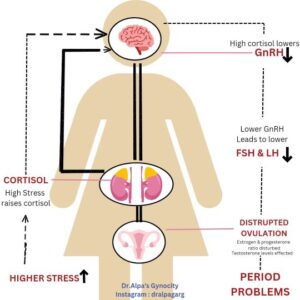
Hormonal imbalance can leave women with a number of different unpleasant side effects. Often women come to my OPD seeking help for their symptoms of unbalanced hormones. The common symptoms being reported are fatigue, fuzzy head, memory difficulties, dizziness, low libido, PMS, bloating, irregular periods, amenorrhea, weight gain, cravings etc. It’s great that these women are looking for the solution, but they need to take it a step further. There is no quick fix to this. The process is gradual. They need to find the root cause behind these imbalances.
Often, women think that they know it all. They behave as if they know everything about the common triggers of hormonal imbalances. All thanks to Google baba, Ha-ha. But one of the most crucial and underrated cause which many of them just tend to ignore is the Stress. Researches show that stress, today is the leading cause of most of the bodily conditions and diseases.
When I tell women that their stress is affecting their hormones, they usually react saying, ” But mam, I am unable to change the stress in my life, so will I have to live with the hormonal imbalances forever?” And my answer to this is “ off course not!” No doubt, that stress is today a non-negotiable part of life and the stress response is a built-in survival mechanism which one can’t turn it off. But certainly, there are ways to use it to cut down on the stress you encounter daily. With this in mind, let’s explore the correlation between stress and hormones in your body
What exactly is Stress ?
Stress as many of us think is not merely mental, stress is basically, any type of change that causes physical, emotional, or psychological strain. It is defined as any situation which tends to disturb the equilibrium between a living organism and its environment. We go through many stressful situations in our daily lives such as stress of work pressure, examinations, psychosocial stress and physical stresses due to trauma, surgery and various medical disorders.
 What does stress feel like?
What does stress feel like?
Stress often contributes to irritability, fear, overwork, and frustration. You may feel physically exhausted, worn out, and unable to cope. Though stress is not always easily recognizable, there are some ways you can check yourself.
- Psychological signs such as difficulty in concentrating, worrying, anxiety, brain fog, memory issues.
- Emotional signs such as anger, irritation, moody fluctuations or frustration
- Physical signs such as high blood pressure, changes in weight, frequent colds or infections, and changes in the menstrual cycle and libido.
- Behavioural signs such as poor self-care, not having time for the things you enjoy, or relying on drugs and alcohol to cope.
The Stress response of your body
Any danger coming towards us is perceived by our brain as stress and this can trigger our body’s stress or the fight-or-flight response. During this reaction, the amygdala in the brain sends a distress signal to the hypothalamus. This activates the sympathetic nervous system causing the adrenal glands to secrete the stress hormone epinephrine (also known as adrenaline) into the bloodstream.
This epinephrine, brings on a number of physiological changes. The heart beats faster. Pulse rate and blood pressure go up. The person starts to breathe more rapidly. Small airways in the lungs open wide and take in as much oxygen as possible with each breath. Extra oxygen is sent to the brain, increasing alertness. Sight, hearing, and other senses become sharper. Secondary process like digestion slows.
The release of epinephrine triggers the release of blood sugar (glucose) and fats from temporary storage sites in the body. These nutrients flood into the bloodstream, supplying energy to all parts of the body. All of this is an instantaneous yet carefully orchestrated sequence of hormonal and physiological changes which helps us to fight the threat off. All this is so quick that people aren’t aware of them.
As the initial surge of epinephrine subsides, the hypothalamus activates another hormone called cortisol from the adrenals keeping the body alarmed and on high alert.
Unfortunately, the body can also overreact to stressors that are not life-threatening, such as traffic jams, work pressure, late night parties, family difficulties etc and we tend stay in constant stress and fight and flight mode.
Here is the video which can give you more clarity
What happens when your body is constantly under Stress?
 There are many types of stress and our body is well equipped to handle it for short term. But the problem lies if the brain continues to perceive something as dangerous or stays in chronic stress all the time.
There are many types of stress and our body is well equipped to handle it for short term. But the problem lies if the brain continues to perceive something as dangerous or stays in chronic stress all the time.
Think of our body like a branch of a tree which can bend and sway with the force of wind which acts like a stress to it. Every time the wind flows, it bends and becomes a little bit weaker. If this happens for days continuously, eventually the branch will break. That’s what is happening in your body — it bends until it just can’t anymore. Then, if the stress doesn’t let up, your body simply becomes too weak to function properly ![]() .
.

What does Stress Hormones do to your body?
The production of cortisol during a stress response, helps our body determine the functions that are most important for survival. Therefore, it pushes non-essential functions into the background. For example
- Raises blood sugar (to feed muscles so you can run away). This can cause weight gain
- Can supress Insulin thereby causing Insulin resistance, sugar cravings, weight gain and PCOD.
- Raises blood pressure (so you can get out of a threatening situation)
- Lowers immune function
- Shuts down digestion and reproductive organs – basically any bodily function that isn’t necessary to survive.
- There is suppression of Gonadotrophins that leads to disruption of the normal menstrual cycle.
- There is delayed ovulation
- Suppresses thyroid function and inhibits the TSH secretion through the action of glucocorticoids on the central nervous system
All these matters of survival are just meant to be a short-term response and when the threat is gone, your body can go back to dealing with other, non-essential functions. But what if your body is continuously exposed to day to day stress and never understands that the threat has passed ? Your HPA axis won’t deactivate, and the secondary functions never get on. That’s when stress begins to have an effect on other hormones, leading to their imbalance. Your body constantly fights to balance your hormone, but if it’s receiving a steady supply of extra cortisol, it’s fighting an already lost battle.
Recognizing symptoms of stress related hormonal imbalances
You may well have noticed these symptoms, and may have correlated to your hormone imbalance– but hardly any of you might have tried to connect the dots between stress and your hormonal difficulties. So, here are some symptoms that you should know and could be stress-related :

- night sweats
- leg cramps
- sleep disturbances
- anxiety
- depression
- loss of libido
- depression and anxiety
- High blood sugar levels
- Immune system issues
- Fatigue
- Memory difficulties
- Dizziness
- Digestion issues – bloating etc
- PMS
- PCOD
- Periods issue
- Infertility
- Vaginal dryness
Can medicines help in this?
The answer is NO. You may get relief temporarily for your symptoms but NO medicine or hormone replacement can actually help to balance your hormones when the causative factor is stress.
Coping with the stress
Recognizing how stress may be impacting your life is the first and very crucial step. But nothing will improve if it’s your only a step! You don’t have to just accept these symptoms as an automatic by-product of stress. Nor do you have to keep living with the stress. You have great power when it comes to your own life — it’s time to start owning it and take action. The question is what are you willing to change, especially with comes to your response to the stress from the earlier years as well as the present-day stressors?
Stay tuned for the next article on how too handle stress.
